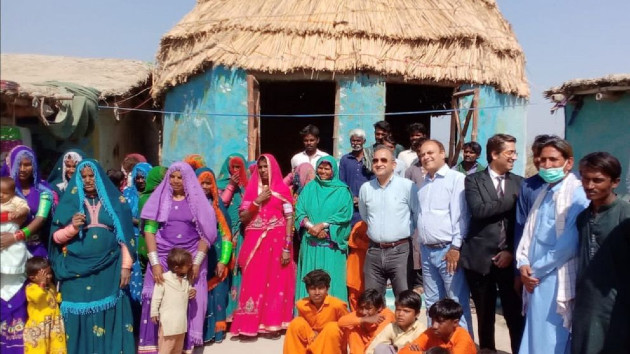(LONDON) — Though Yasmeen Lari, co-founder of the disaster relief nonprofit Heritage Foundation of Pakistan, is no stranger to distress, she felt “devastated” by one recent photo, which captured a now-deceased mother’s birth as witnesses pulled her infant out of the muddy water.
Pakistan received over three times its usual rainfall in August, marking this storm as one of the area’s deadliest natural disasters in five decades. The enormity of the tragedy, she said, requires a national paradigm shift toward solutions and away from “outsider handouts.”
In the weeks since the flooding, Heritage Foundation of Pakistan, created in 1981, has provided 1,200 bamboo material sets to Sindh, one of the nation’s hardest-hit provinces.
By the end of August, Pakistan’s minister of climate change said one-third of the country was under water — an area with roughly 33 million people — and the torrential downpour washed away communities, leaving people at risk of waterborne illnesses, drowning and malnutrition.
The government of Pakistan estimated the total losses to be worth upward of $40 billion from the flooding. Climate change will propel this extreme weather to continue wreaking havoc on Pakistan and the rest of the world, according to the World Meteorological Organization.
Often labeled Pakistan’s first woman architect, Lari, 81, had a storied career of designing commercial buildings, such as the Taj Mahal Hotel, the Finance and Trade Center and the Pakistan State Oil House Headquarters in Karachi. She retired in 2000, pursuing humanitarian architectural efforts that intersect Pakistani culture and low-carbon, pragmatic solutions, which she has called her “past life’s atonement.”
Experts are not needed to assemble Lari’s shelters, as the Heritage Foundation of Pakistan has released YouTube guides for those who need to quickly learn.
Lari differentiates her nonprofit from others by focusing on knowledge-sharing and finding ways for women to participate in their own livelihoods and autonomy.
Women in Pakistan, she said, have capabilities to create beauty and patterns, just as they were taught by their mothers and their mothers before them.
On the other hand, charity responses to Pakistan’s past disasters have been “alien to the terrain and to the people,” Lari said.
“Everything is co-created,” Lari said. “Our materials must provide social and ecological justice so that human life is at the forefront.”
Perhaps most importantly, Lari believes that empowerment is more effective than handouts. To emphasize her prioritization of dignity and maternal connection with Pakistan, she applied the metaphor of dastarkhwan, a name used across Central and South Asia referring to a traditional space where food is eaten.
“I link the project to a mother’s dining room, which has cooked for the whole village,” Lari said. “Nobody is throwing bags of food rations at you, but the progress is done in a civilized manner.”
Copyright © 2022, ABC Audio. All rights reserved.


